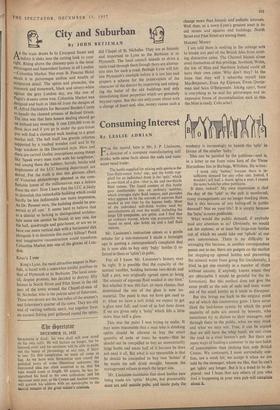Consuming Interest
By LESLIE ADRIAN
OR the record, here is Mr. J. P. Lissimore, r a director of a company manufacturing soft drinks, with some facts about the soda and tonic water retail trade : The bottle supplied for mixing with spirits is the four-fluid-ounce `baby' size, and the bottle sup- plied for an individual drink is the `split,' which is one-third of a pint—that is, six and two-thirds fluid ounces. The liquid content of this bottle goes comfortably into an ordinary tumbler, which averages eight fluid ounces, and provides what appears to be the amount of aqueous fluid needed at one time by the human body. Most of the individual soft-drink bottles used by manufacturers all over the world, including the large US companies, are splits; and 1 find that an ordinary teacup, whose size presumably was based on need, also holds six and a half fluid ounces.
Mr. Lissimore's instruction comes as a gentle rebuke for a mis-statement I made a fortnight ago in quoting a correspondent's complaint that he is now able to buy only 'baby' bottles (1 re- ferred to them as 'splits') in pubs.
For all I know Mr. Lissimore's history may be right. It is possible that the capacity of the normal tumbler, holding between two-thirds and half a pint, was originally agreed upon as being 'the amount of aqueous fluid needed at one time.' But whether it was this fact, or mere chance, that determined the size of the glass is now im- material. The point is that we have got used to it; when we have a soft drink we expect to get a glass near full; and most of us feel done down if we are given only a 'baby' which fills a little more than half a glass.
This was the point I was trying to make. It may seem reasonable that a man who is drinking spirits should be allowed to buy the exact quantity of soda or tonic he wants—that he should not be compelled to buy an unnecessarily large bottle and waste half of it because he does not need it all. But what is not reasonable is that he should be compelled to buy two 'babies' if he wants his soft drink straight, because the management refuses to stock the larger size.
Mr. Lissimore maintains that most bottles now being made are 'splits.' Maybe, but presumably most are sold outside pubs; and inside pubs the tendency is increasingly to banish the 'split' in favour of the smaller 'baby.'
This can be justified by the publican—and is, in a letter to me from mine host of the Threo
Horseshoes Inn in Burbage, Wiltshire. He writes : I stock only 'babies,' because there is in- sufficient demand for any other size. Indeed, I wouldn't sell half a dozen splits a year. I expect the same holds for other publicans.
It does, indeed! My own impression is that the day of the 'split' in the pub is numbered; many managements are no longer stocking them. But is this because of any falling-off in public demand? Not on your life! It is simply because the 'baby' is more profitable.
What would the public demand, if anybody paid any attention to us? Obviously, we would ask for siphons, or at least for large-size bottles out of which we could take our 'splash' at our own convenience. There is no difficulty in arranging this because, as another correspondent points out to me, there are gadgets on the market for stopping-up opened bottles and preventing the mineral water from going flat (incidentally, I tried to get one recently in a number of shops without success; if anybody knows where they are obtainable I would be grateful for the in- formation). But this method does not give the same profit as the sale of soda and tonic water out of the small bottle; so it tends to disappear.
But this brings me back to the original point out of which this controversy grew. I have never liked the tied-house system by which the great majority of pubs are owned by brewers, who sometimes try to dictate to their managers, and through them to the public, what we may drink and what we may not. True, it can be argued that we still have the whip hand; we can cross the road to a rival brewer's pub. But there are more ways of leading a customer to the new habit of consumption than choking him with Bristol Cream. We customers, I must sorrowfully con- fess, are a weak lot; we accept it when we are told by the manager, whom we like, that he can't get 'splits' any longer. But it is a trend to be de- plored; and I hope that any others of you who find it happening in your own pub will comglain about it.






































 Previous page
Previous page